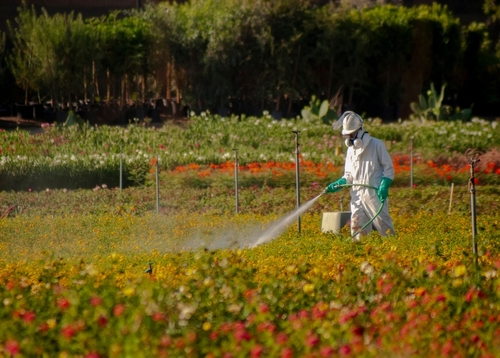
In an era where sustainable practices are increasingly prioritized, scientists have embarked on a controversial endeavor: utilizing human urine as fertilizer for growing vegetables. This practice has ignited a fascinating debate from a conservative perspective, blending issues of environmental sustainability with ethical qualms and health concerns.
At first glance, the use of human urine in agriculture might seem like an innovative loop in recycling waste into a resource. Proponents argue that it is rich in nitrogen, phosphorus, and potassium, essential nutrients that plants crave. In theory, this could reduce our reliance on chemical fertilizers, decrease agricultural runoff, and make farming more environmentally friendly.
This company is on a mission to turn your urine into fertilizer for plants🪴 pic.twitter.com/7Ua3k1vxNP
— NowThis Impact (@nowthisimpact) April 22, 2024
However, conservatives are raising significant ethical and health concerns. First and foremost are the safety implications. Can a process ensuring that harmful pathogens and pharmaceutical residues are removed from urine before its application on crops be guaranteed? The thought of consuming vegetables grown with human waste might be unpalatable to many, raising questions about public acceptance of such produce.
Moreover, there's an argument to be made about the sanctity of our food supply. Traditional values hold that certain practices are inherently undignified or disrespectful, and using waste products in food production may cross a moral boundary for some. It challenges our conventional views on cleanliness, purity, and respect for the food that sustains us.
Scientists want to grow vegetables using human urine – and reveal how YOU can make the natural fertilizer at home https://t.co/gJ99nM5HNr pic.twitter.com/RfQaKkbOp9
— Daily Mail Online (@MailOnline) April 25, 2024
On the economic front, the viability and scalability of collecting and processing human urine for agricultural use pose another set of challenges. While small-scale experiments might show promise, a conservative viewpoint might question whether this method can meaningfully contribute to global food security without imposing undue logistic and financial burdens on farmers and consumers.
There's also a broader philosophical debate about human interaction with the environment. While sustainable and regenerative agricultural practices are crucial in addressing climate change and degradation of arable land, there must be a line where we consider whether our interventions respect or undermine the natural world. Is turning human waste into food crossing that line?
Critics within the conservative camp further worry about the slippery slope of normalizing what might be deemed unnatural or untested practices. There's a cautious approach to new technologies and methods, particularly when they pertain to something as fundamental as our food. The history of agriculture is riddled with innovations that promised efficiency and sustainability but led to unforeseen negative consequences.
In conclusion, while the aim of reducing waste and promoting sustainability in agriculture is commendable, the use of human urine as fertilizer is met with considerable skepticism from a conservative standpoint.
The debate encapsulates a broader discourse on how we balance innovation with tradition, progress with caution, and environmental stewardship with ethical integrity. As research continues, it will be essential to carefully weigh these considerations and ensure that our pursuit of sustainability does not compromise our values or well-being.
What are YOUR thoughts?
We want to hear from you! Please comment below to join the discussion.











These quote “conservatives” sound m9re left wing objecting to real sustainability without real facts. For decades farmers have been using animal and human eastern on the crop fields which is a whole lot healthier than chemically produced fertilizers. Example a dry land crop farmer used out house fertilizer on the fields. This put nutrients back in the soil plus prevented compaction of that soil. Couple the practice of plowing under the surface where 10 in of sub soil was brought to the surface. Past fertilizing had time to break down and disburse any potential harmful chemicals in the soil. Recycling something the “conservatives ” should applaud. There is no bases to their claim. Trouble making for more chokeholds on the family farm. Back to the dryland farmer he was ranked 3rd in crop yield for the entire county with zero irrigation. He saved water and produced high yields. Its a sorrow people shoot their mouths off with out actual experience causing discord. It’s a practise of composting which is used in gardens. So it’s like sit down and hold my beer watch this.
How about having dredging facilities where the rivers empty out into the sea and catching all that good silt to make healthy fertilizer instead of letting the nutrients just wash into the sea as we have been doing for a couple hundred years now, which is why the soil is depleted in the first place?
Once processed human waste is clean and can be used as Fertilizer. Go to Japan where they use human waste as fertilizer and have for many years. Once processed there is very little chance of passing on any illness and it is just the same as using cow manure or that of any other animal. Using urine would be just like using what they use now and won’t even smell different. Living in farm country I get assaulted by the smell of the current acceptable fertilizer so it would be the same smell and the same chemicals doing the crop feeding,
You can always use Round up and die from cancer. Manure is used everywhere as fertilizer. Of course it comes from cows and horses, but it has been used forever, and we all survived. People in bad situations with no water, have had to drink their own urine. You need to be more worried about why Bill gates and China is buying up millions of acres of our farmland . Green acres is not in Gates or Chinas wheel house, and fertilizer is the lest of our worries.
Using animal waste for fertilizer can be injected into the ground or spread onto fields. Using human urine as fertilizer is questionable. Growing up on a farm, all I have ever seen human urine do is kill everything it touches or kills the soil.
Animal waste has been used for centuries to promote growth of crops. If one can see past the IDEA of using human waste “because we’ve never done that”, perhaps it’s a good and safe idea!